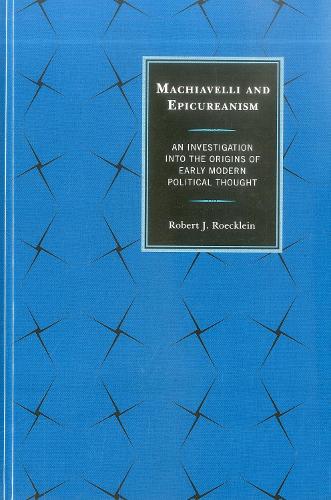
Machiavelli and Epicureanism: An Investigation into the Origins of Early Modern Political Thought
(Paperback)
Available Formats
Publishing Details
Machiavelli and Epicureanism: An Investigation into the Origins of Early Modern Political Thought
By (Author) Dr. Robert J. Roecklein
Bloomsbury Publishing PLC
Lexington Books
2nd September 2014
United States
Classifications
Professional and Scholarly
Non Fiction
Political science and theory
320.1
Physical Properties
Paperback
256
Width 155mm, Height 225mm, Spine 17mm
345g
Description
This book investigates the influence of Epicurean physics on the argument developed in Machiavellis Discourses on Livy. Towards this end, the full philosophical history and origins of atomist philosophy are investigated during the first three chapters. Platos critique of the atomist philosophy, from his dialogue the Parmenides, is a part of that investigation. In fact, Plato provides a refutation of the atomist philosophy in the Parmenides. A significant amount of scholarship has been accomplished that demonstrates the currents of Lucretian atomism in Machiavellis Florence. Evidence is supplied as to Machiavellis exposure to the Lucretian text, and the book then proceeds to investigate the transformational arguments of the Discourses On Livy itself. Machiavellis Discourses are saturated with terminology that is borrowed from physics: materia (Matter), corpo (body), forma (form), accidente (accident). English translators have usually employed some theory as to which tradition of physics Machiavelli is relying upon, in order to conduct their translations. By borrowing the terminology of Lucretian physics, Machiavelli becomes able to conceive of the people in a political society as something less than human: as matter or materia without form. In my analysis of Machiavellis deployment of the concepts from Lucretian physics, it is attempted to unveil the brutality that is inherent in Machiavellis new definitions of the elements of politics, and the general hostility of his political science to the Aristotelian concept of the human being as political animal. The classical physics of Aristotle, which Machiavelli has rejected for a model, indicates the forward looking momentum of natural beings. For Aristotle, nature intends human political society as the arena for human fulfillment. In Aristotelian physics, nature aims at an end in generation, i.e. at a culmination of the natural being in its proper condition of excellence. For human beings, this is justice, the quality of relationships that makes happiness possible. In Machiavelli, a new politicized physics is revealed. In Machiavellis model, the human beings of formed matter are repeatedly sent, through new institutions and methods of government, back to their beginnings, i.e. to a condition of isolation, destitution, injury, and pain. The last chapter of the book concludes with an examination of the particular institutions and methods that Machiavelli holds out to us for employment, if his new vision of a republic is to be realized.
Reviews
Machiavelli imparted new meanings to the moral vocabulary of the ancients. Virt, for example, means nearly the opposite when used by Machiavelli (acquisitive success) as when used by Aristotle (self-restraint). Roecklein does a service by tracing this vocabulary to Epicurean philosophy, of which Machiavelli is said to be a proponent. Thus words like accidente, materia, and corpo carry substantive significance and must be retained in translations, Roecklein argues. Before turning to Machiavelli, Roecklein devotes three chapters to explicating Machiavelli's supposed sources: Parmenides, Epicurus, and Lucretius. The book is actually more about them than about Machiavelli. But the parts on Machiavelli are quite bold and cutting, as Roecklein attacks head on the republican interpretations of Quentin Skinner and J. G. A. Pocock. Machiavelli is anti-democratic because he commandeers language and discountenances the perceptual world of ordinary people. His political science is anti-deliberative, since choice causes corruption and decline. His new modes and orders are an assault on human dignity and claims to justice for the sake of order, and so on. A valuable addition to Machiavelli scholarship. Summing Up: Highly recommended. Upper-division undergraduate, graduate, and research collections. * CHOICE *
Roecklein's arguments for the influence of Lucretius on Machiavelli are compelling. . . . The greater contribution of the volume will be to the study of Epicurean-Lucretian atomism and its legacies, rather than assessment of Machiavelli's political philosophy. * Polis *
For anyone interested in studying the atomistic and epicurean matrix of Machiavellis political thought, and hence of a part of modernity, this book is important because it shows how it is the principal reference which guides Machiavelli in the construction of his philosophical categories and in the polemic against other philosophical traditions. * Storia del Pensiero Politico *
Robert Roecklein has given us a superb study of Machiavelli's political theory and its relation to classical philosophy. By connecting Machiavelli to Epicurean thought, he shows a new layer of his political theory and argues that his relation to both modernity and antiquity need to be rethought. Rocklein's book is important in showing us that we can take much more from Machiavelli's thought than contemporary scholarship has allowed. In so doing, he provides us with a revealing interpretation of Machiavelli, a thinker who has been as misunderstood as much as he has been demonized. -- Michael J. Thompson, Associate Professor of Political Science, William Paterson University
Author Bio
Robert J. Roecklein is currently a lecturer in rhetoric and political philosophy at Penn State Erie, the Behrend College.
